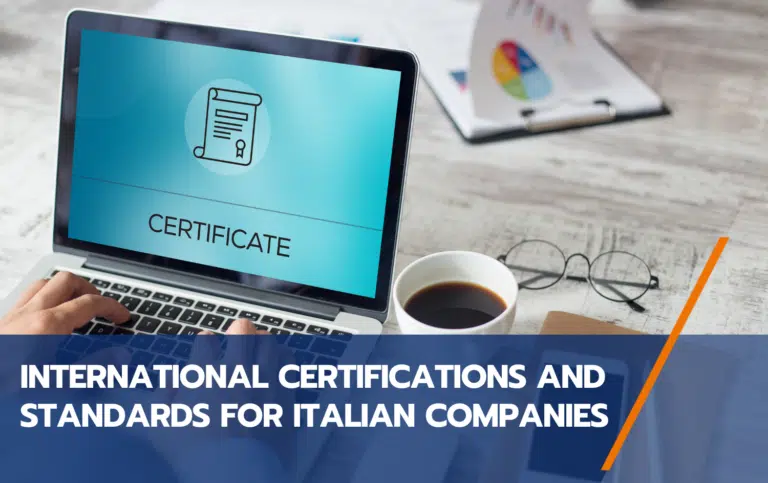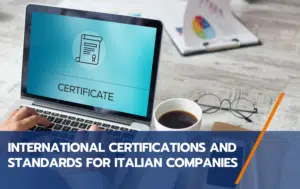First and foremost, Italian companies seeking to expand their activities abroad must face the complexities of international certifications. These standards are necessary to ensure that products and services meet the quality, safety, and environmental standards required by international markets. Compliance will not only facilitates entry into these markets but also increase consumer trust and improve competition.
In this article, our experts analyze the importance of international certifications for Italian companies, and provide detailed key certifications and strategies to get them.
The importance of International Certifications for Italian companies
- Market Access: Imported goods face strict regulations in many countries. Certifications often act as a key for Italian companies to easily access these markets.
- Consumer Trust: Consumer trust is established through certifications, which demonstrate a brand’s dedication to quality and safety, thus increasing confidence in consumers.
- Competitive Advantage: Certification sets your products or services apart from competitors, providing an edge in the marketplace.
- Operational Efficiency: Increasing operational efficiency by adopting standardized procedures enhances internal operations by reducing waste and optimizing production flow.
What are the key International Certifications for Italian Companies?
1. ISO Standards
- ISO 9001 (Quality Management Systems): This standard guarantees that companies maintain quality across all operations. Certification signifies a company’s commitment to delivering consistent products and services, meeting both customer and regulatory requirements.
- ISO 14001 (Environmental Management Systems): This certification is necessary for companies aiming to increase sustainability by minimizing the environmental effects of their operations.
- ISO 45001 (Occupational Health and Safety Management Systems): Helps organizations create safe working environments, reducing workplace risks.
2. CE Marking
- European Economic Area (EEA): CE marking indicates that a product complies with the relevant EU directives and regulations, such as those for machinery, electrical equipment, and medical devices.
- Market Entry: Products with CE marking can freely move and be sold throughout the EEA, offering access to one of the world’s largest markets.
3. FSC Certification (Forest Stewardship Council)
- Sustainability in Forestry: FSC certification is crucial for Italian companies in the furniture, paper, and timber industries. It ensures products come from responsibly managed forests that provide environmental, social, and economic benefits.
- Consumer Recognition: The FSC label is recognized worldwide and preferred by environmentally conscious consumers.
4. Global Food Safety Initiative (GFSI) Standards
- Food Safety: Italian food and beverage companies aiming for international markets must comply with GFSI-recognized schemes like BRC (British Retail Consortium), IFS (International Featured Standards), and FSSC 22000.
- Retail Partnerships: Many global retailers demand GFSI certification from their suppliers, making it indispensable for companies in the food industry.
5. Energy Certifications
- ISO 50001 (Energy Management Systems): This standard guides companies on managing energy use efficiently, reducing costs and environmental impact.
- LEED (Leadership in Energy and Environmental Design): An internationally recognized certification for green buildings that helps companies demonstrate their environmental responsibility.
6. Social Responsibility Certifications
- SA8000 (Social Accountability International): This standard focuses on fair labor practices and workers’ rights, ensuring that companies operate ethically.
- Fair Trade: Especially important for food and beverage companies, Fair Trade certification guarantees that suppliers receive fair compensation.
Steps to Achieve Certification
- Research Requirements
- Understand Standards: Familiarize yourself with the specific requirements for each certification and standard relevant to your industry.
- Gap Analysis: Conduct an internal audit to identify where your business currently stands and what gaps need to be addressed.
- Develop Implementation Plans
- Documentation: Create detailed documentation of your management systems, procedures, and policies to align with the chosen standards.
- Training: Ensure staff understands the standards and how their roles contribute to compliance.
- Implement Changes
- Operational Adjustments: Adjust workflows, supply chains, and production lines as necessary to meet certification requirements.
- Monitoring and Evaluation: Regularly assess progress and make improvements where needed.
- Internal Audits
- Pre-Certification Audits: Conduct internal audits to evaluate the effectiveness of your compliance efforts.
- Corrective Actions: Address any deficiencies identified before applying for certification.
- Apply for Certification
- Certification Body: Choose an accredited certification body and submit your application.
- External Audits: The certification body will conduct external audits to assess compliance.
- Continuous Improvement
- Regular Reviews: Conduct periodic reviews to maintain certification and continuously improve your processes.
- Recertification: Many certifications require periodic recertification, so plan for these in advance.
Overcoming Challenges in Certification
- Cost: Certifications can be costly, especially for small businesses. Consider government grants or partner with industry associations to defray costs.
- Complex Regulations: International standards can be complex. Engage with consultants or industry experts to streamline compliance processes.
- Change Management: Implementing new standards often requires significant changes in organizational culture. Effective communication and training can help overcome resistance.
Conclusion
Italian companies looking to grow their presence worldwide find international certifications and standards to be essential tools. They not just make market entry easier but also promote trust among consumers and operational effectiveness. By grasping important certifications and following a methodical process to acquire them, Italian companies can set themselves up for sustainable growth in the international markets.









